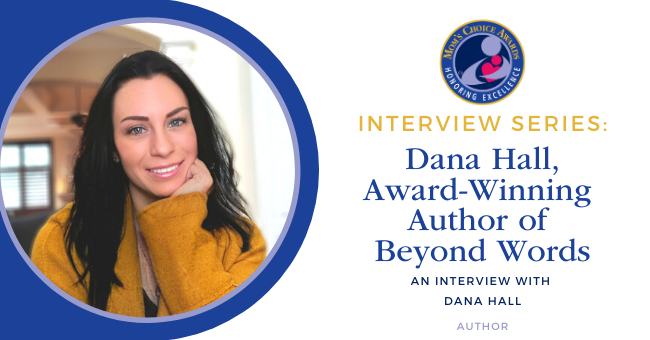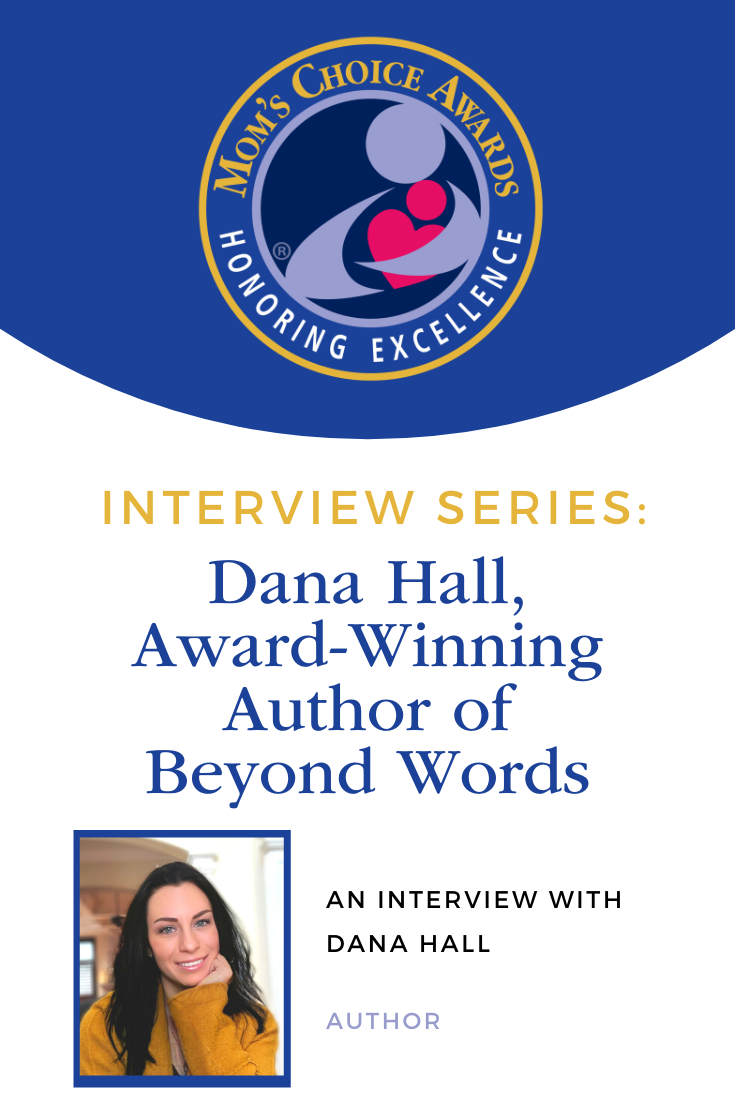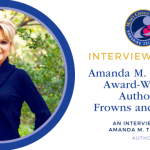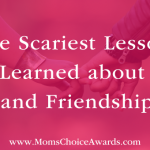Mom’s Choice Awards is excited to announce another post in our interview series where we chat with the inventors, designers, publishers, and others behind some of our favorite family-friendly products.
Hello, Mom’s Choice readers! Thank you for joining us for another installment in our interview series. We were able to chat with Dana Hall, the author of the MCA award-winning book, Beyond Words. Beyond Words is an early childhood book that is full of the power of friendship, connection, and imagination that is a valuable social-emotional teaching tool perfect for any home library, school, speech-language program, or classroom. Keep reading to find out more about Dana and her wonderful book, Beyond Words.
MCA: Hi Dana! I would like to congratulate you on your MCA for Beyond Words! Beyond Words is not only an important book for children with speech/language challenges but also for children without disabilities to help them be more understanding and inclusive. It is evident within this book that you have a lot of experience with speech/language challenges such as Apraxia of Speech (CAS). Can you tell us a little bit about that experience and your background?
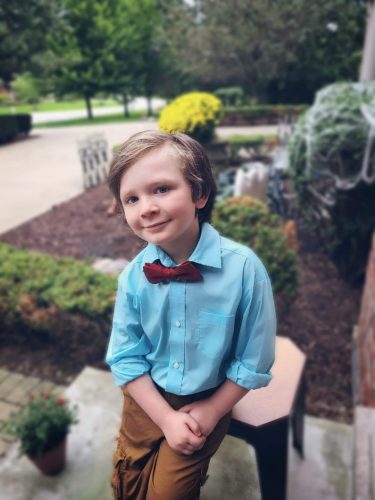
Dana Hall’s son, Shawn Michael.
Dana: I have nearly two decades of clinical, research, and leadership experience in the field of psychology. I received my BA in psychology, summa cum laude, and graduate degree in community agency counseling from Saint Xavier University, Chicago Il. My private therapy practice work specializes in chronic illness management, trauma, and relational issues. I’m passionate about my clinical work and social justice advocacy; and love being an author, public speaker, and activist for inclusion and trauma-informed practices in education and counseling.
For me, it’s important to write works that make a difference. I strive to give voice to the diverse narratives that may not otherwise be heard. In addition to Beyond Words: A Child’s Journey Through Apraxia I released We All Belong: Musings on Inclusion, Acceptance, and Kindness and Made to Overcome Caregiver Edition in 2020. In February of 2021, my chapter on how to quit people-pleasing is featured in the book, I Quit Letting Go Of What No Longer Serves You. I’ve been featured in Chicago Parent Magazine, and written articles for Deep Soulful Love, A Chronic Voice, and Her View From Home. I was honored to deliver the keynote address for the Spondyloarthritis National Convention 2020 and subsequently publish an Op-Ed piece in Spondylitis Plus Magazine.
In terms of hobbies, I’m an avid reader and love theatre. I’ve been an actor for over twenty years in Chicago and recently founded a virtual theatre company to keep the arts alive during the pandemic. My personal and professional history centers around my love of story and storytelling. The narrative is such a powerful means to connect and feels like something that I will always be deeply connected to in various forms.
MCA: Was it your work in the field of psychology and your love of storytelling that inspired your path to become a writer?
Dana: As a clinical therapist, I hear a lot of narratives and I am always deeply moved by the power that comes from owning our story. Also, I studied acting early on in life where my job essentially meant bringing stories to life. My passion for helping others and storytelling have remained intertwined in my life. It has only been recently that I started to write for publication; my journal was full of entries but I was filled with self-doubt. I heard Brene Brown, author/social worker, say something during a TED talk that pushed me through my vulnerability hangup, “You either walk inside your story and own it, or you stand outside your story and hustle for your worthiness.” I started to look at moments in my life where I felt alone or scared and write them out, taking back my narrative and hopefully helping others to feel not so alone too. Beyond Words was a poem in my journal that I wrote two years before I published the book.
MCA: Tedtalks are always so inspirational and you never know when you will hit one that really sticks with you. What made you decide to turn that poem into the book it is today?
Dana: The catalyst for writing Beyond Words was an incident that happened at a park about two years after my son’s Apraxia diagnosis. He was almost five and it was the summer before kindergarten. I took him to the same park almost every day that summer. He started this game where he was a lava monster and the kids would run and he would laugh. He was connecting, without words- or so I thought.
One day during our usual park visit, I did not hear the lava monster make his entry. I casually snuck away from the parent bench and began checking high and low. Somewhere past the swings, I heard it. My heart sank deeper as I tracked the sound of muffled crying. I found the lava monster under the slide. As soon as my eyes fell upon him, I knew something was different. It felt like someone gut punched me. The light in his eyes had dimmed. I understood his approximation right away and it broke me. He looked up and said, “I no monster.”
This moment was harder than the day we received his diagnosis of apraxia. Maybe because on this day, I realized what apraxia had taken from us. I will never forget the echo of our tears under the slide. I came home that day and wrote in my journal the poem that became “Beyond Words.”
I know I’m not alone, so many parents fear the vulnerability of having their child step into the unknown world of school; will they be safe? Will they make friends? My child was about to do that but could not advocate for himself. If I could help to prevent that light from dimming for one other child and/or help one parent feel not so alone- then this book has done its job. I never want anyone to feel like they have to be something they are not to be accepted.
Beyond Words, has helped us cope, contribute, and connect. My son, Shawn-Michael, drew the illustration of the lava monster in the story, it’s really special to see him own his story. I was fortunate to be able to be a guest reader in Shawn-Michael’s class and read the book.
MCA: You obviously have a very personal relationship to childhood apraxia of speech (CAS). Can you give us more information about childhood apraxia of speech and why books like Beyond Words are so important for children with CAS?
Dana: Childhood apraxia of speech (CAS) is a speech disorder in which a child has difficulty making accurate movements when speaking. In CAS, the brain struggles to develop plans for speech movement. For my son and many others, it is present at birth however, those suffering TBI or stroke could also present with Apraxia. Apraxia has a higher comorbidity rate in those with Autism though they can be mutually exclusive.
With this disorder, the speech muscles aren’t weak, but they don’t perform normally because the brain has difficulty directing or coordinating the movements. A great example would be to imagine someone asked, “What’s your favorite book?” You know exactly what you want to say. You go to say it and nothing comes out or you utter sounds that do not make the words that are in your head. Your thoughts are clear, your desire to communicate the idea is strong but somewhere between your brain and your mouth, the words get lost. Imagine typing on a keyboard than having the keys all re-arranged for each word; you are searching and while you search you are trying to put together the next thought. As you are thinking keys keep falling off.
Can you imagine the level of frustration you might feel if this is your daily experience? People may make assumptions about your desire to connect or exclude you entirely, they may also assume you have an intellectual disability, or a behavior disorder. All of which have been inaccurate assumptions made about my son and other apraxia kids and adults.
It’s imperative we teach children at an early age how to be inclusive, accepting, and kind to all peers. It is so important for all children to be able to see a representation of themselves in books, movies, and media. I wanted to expose children to various forms of communication and normalize their use of self-expression. Therefore, in the book, you will see children using sign language and assistive technology devices as a means to communicate.
Increasing awareness can also lead to better verbal outcomes for Apraxia kids since early intervention with a speech-language pathologist trained to treat this disorder is the most effective form of treatment. Many children with apraxia of speech, even at young ages, have some awareness of their difficulty and can exhibit frustration and anxiety by not being able to get their needs met. Too often do I hear people say, “they are just a late talker.” Any delay to speech should be evaluated by a trained SLP (speech-language professional) and I will continue to advocate for insurance companies to cover these evaluations. Left untreated those with Apraxia have diminished odds that they will ever be able to speak.
MCA: What are some of the key lessons found in Beyond Words? Why is it so important to promote kindness, inclusion, and acceptance to children especially at an early age?
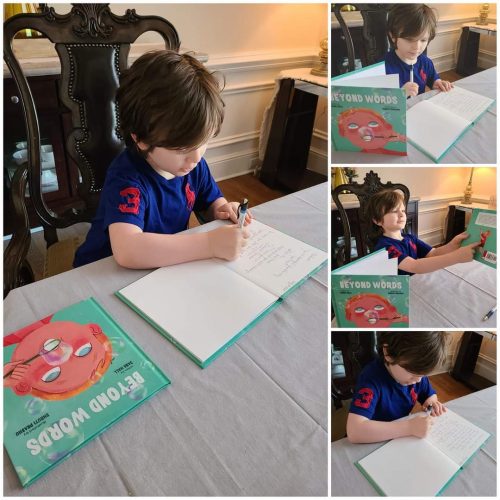
Dana Hall’s son, Shawn Michael, and “Beyond Words.”
Dana: There are many lessons to be found in this book that go beyond language disorders. In particular, I want to encourage what I call mindful interactions. Mindful interactions are when we learn to consider the impact of our words, deeds, and behaviors on others when we interact with someone. The book illustrates various ways children can connect with peers, and highlights how everyone has something of value to contribute to the world around them.
Instilling this mindset at an early age is important because statistically, we know that 1 in 20 children have a disability that means there are 20 opportunities to advocate and educate children on what the concepts of kindness, inclusion, and acceptance look like in practice. Too often the responsibility seems to fall squarely on the back of the child with the disability to assimilate, we need to make sure all children are presented with the tools to create friendships and positive social engagement.
Facilitating conversations about our diversity is so important, the variance we have as a society is truly one of our greatest strengths- not a weakness or deficit. Yes, as a mom I was filled with fear for him. I worried about his future, I see things differently now, and I’ve moved through that fear to hope. His future was never mine, or anyone else’s, to define. He is absolutely who he is meant to be and learning to connect to him beyond words has changed how I see the world. In a fast-paced world, I hope Beyond Words reminds us to slow down and act with intentional mindfulness and kindness. Ultimately, I want people to think first before they make comments that could be hurtful and see that spoken language is just one valid way we communicate.
MCA: I’ve read a couple of rave reviews your book has received from thankful parents, teachers, and caregivers alike. How do you feel about all the attention your book has received?
Dana: All the times I sat and listened to other parents talk about their child’s favorite foods, color, or how much they just won’t stop singing a song as I waited for my three-year-old to be able to call me mom left me feeling on the outside of parenting, it now feels like I found my tribe. Every time a parent reaches out to me it heals that place in me that felt so alone and scared when he was first diagnosed.
The overwhelmingly positive response from parents, educators, speech pathologists and apraxia kids has been amazing. Parents usually tell me they first cry upon reading the book because they feel seen for the first time. This holiday I happened upon an Apraxia support page where there were over a hundred posts about the book! It warmed my heart to read how many people received it as a Christmas present.
My inbox is full of pictures I’ve received from parents of their children reading the book, it is so much fun to see them laughing and pointing at the illustrations. Several parents wrote this is their favorite book on the topic and that they have gifted copies to their child’s school or have asked the teacher to read it to the class. In terms of the public reception to the book, I was interviewed for Chicago Parent Magazine and have been invited to speak on several podcasts on special needs and neurodiversity. StoryTime and the 3 Bears hosted a reading of the book on their youtube channel which makes the story accessible to a larger audience. Awnie’s House, which averages over a million YoutTube views on their story links, has confirmed they will air a reading in Spring 2021 as well. All of the interest in the book has led me to found the #BeyondWords Movement on social media to continue to create awareness for neurodiverse children and adults.
MCA: That is so amazing and such a great way to spread awareness for neurodiverse children and adults #BeyondWords! Well, thank you Dana for a wonderful interview and very informative interview. Before I let you go, do you have anything else you would like to add?
Thank you for having me! I am honored to be awarded the Mom’s Choice Award and to see my title amongst the influential works of other recipients is one of the biggest compliments as an author I could receive.
Just a few items of interest. In addition to the book, I’m creating a workbook that provides a social-emotional curriculum for children ages 2-8 years old. Currently, you can access almost a dozen free full-page worksheets on the topic of inclusion, acceptance, and kindness which can be used with or without the book by following this link: BeyondWordsWorkbook. A fun fact is that the e-book version of Beyond Words looks amazing in the virtual classroom. Teachers can pick up an e-book, paperback, or hardcover copy of Beyond Words on Amazon and Barnes & Noble.
Also, I encourage parents, advocates, SLPs, and apraxia warriors to join me in the #BeyondWords movement on social media. Together we can create greater awareness for neuro-diverse children and adults. These children may be fighting for their voice, but they don’t have to fight alone! To stay up to date on materials, book tours, and exciting collaborations we have coming up visit my website: DanaLHall.com.
Amazon Link:
Beyond Words: A Child’s Journey Through Verbal Apraxia by Dana Hall
FB Community:
@BeyondWordsApraxia
Free Educational Materials/Handouts From Book
KindnessMatters
Here is a reading of BeyondWords:
Storytime and the Three Bears Read Beyond Words
A Parent Perspective on Apraxia of Speech:
TheLavaMonster&TheSlide
MCA: Thank you for those resources, Dana. We will definitely be checking them out!
You can learn more about Dana Hall and her award-winning book, Beyond Words by visiting her MCA Shop pages.

